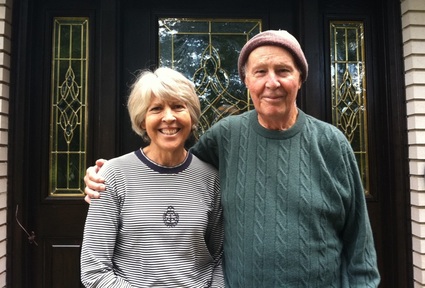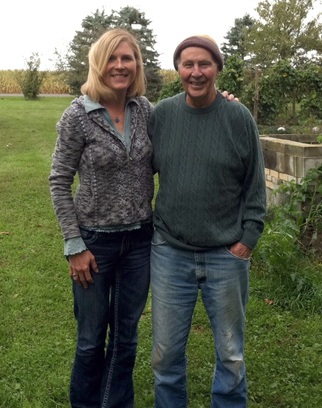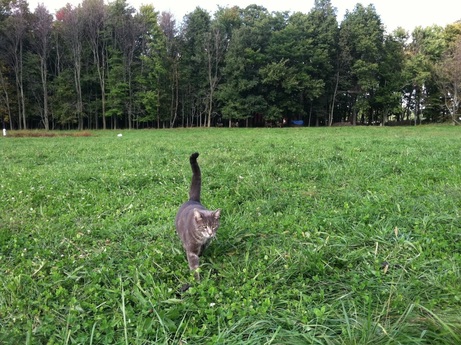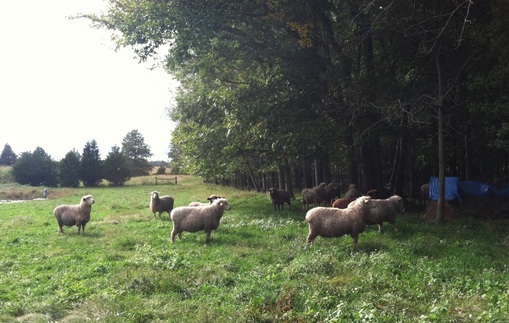
I can relate to Gene’s affinity for Wendell’s writing. After reading an essay by Gene Logsdon in the book, "The New Agrarianism," I knew I wanted to meet Gene. In no way, can I compare to his and Wendell's literary excellence nor years of dedication to a pastoral life but his writing struck a chord with my food system aspirations and I knew I had to meet him. And that wish came true this past weekend.
Gene is one of farming’s most prolific writers with over 25 books, countless essays and now a thriving blog, The Contrary Farmer. In 1975, he moved with his family from Philadelphia back to his home of Upper Sandusky, Ohio and purchased a small 22-acre farm. As a longtime lover of art, his farm became his canvas. And like an artist, he would use his landscape to experiment with growing techniques and farming designs that mimicked nature’s biological processes. He wrote about his practical experience sharing his wisdom and pastoral philosophy with others. His writing had a symbiotic relationship with the farm just like the interdependent relationships observed in nature between plants and soil, livestock and grass, etc. One feeds the other.

We spoke at length about “How to get BIG ag interested in being more sustainable?” For a long time, I’ve wanted to believe that conventional farmers were just hog-tied to a system - caught in a viscous cycle with government subsidies and Monsanto contracts. Otherwise, I felt they were stewards of the land and saw the destruction their farming practices had and would change if given the financial incentive. Quite the contrary Gene says, “most think they are helping to feed the world.” My idealism was set back by this fundamental difference. But as the afternoon progressed, I started to understand Gene’s approach to this question. It’s not so much about transitioning to organic certified as it is about transitioning away from industrial agriculture. But how do we get there? Storming the castle with pitchforks and torches is not an effective form of persuasion. Nor is pushing a hard line of organics on conventional growers. But if we can get larger farms to downsize into small and mid-sized farms, we could break the current commercial model. Smaller farms can adopt sustainable farming practices easier than larger ones because they can accommodate biodiversity better thus requiring fewer outside inputs to control pests and weeds. Food will not have to travel as far because the farms will be supporting a local economy as part of a more, regional, food system.
Gene offers a great suggestion in a recent blog post on September 14th entitled, “Small Farms Creates More Jobs.” Here’s the skinny…many of the big-daddy corn producers have anywhere between 4,000-6,000 acres. It takes only one farmer and one to two ranch-hands to farm these mega-farms because of the ginormous equipment available today. What if just a fraction of the 90 million acres of corn fields nationwide (and remember we are just talking corn, doesn’t include other commodity and specialty crops) were broken down into smaller 150-300 acre family farms? Each could employ 2-4 people and their families. Many farmers are getting older. They may not have next of kin to take over the farm or their children may not want to continue farming. The opportunity awaits these families. But we have to reach them before Monsanto or a developer does and prove the economic benefits for them, the immediate future of their community and future of their grandchildren.


We sank bank into the woods connecting the pastures to the house. At the entrance to the backyard, two, deep rubber bins were buried in the ground up to their lids. “Outdoor root cellars right?” “Yes, exactly! We keep potatoes in them,” replied Gene. “I love simple ideas like that,” I commented. “Not enough money in simple ideas,” said Gene. It was subtle but profound. Conventional agriculture is far from simple. But it's where it is today because industrialization is considered profitable and the way to make money. Ironically, it’s those simple ideas that are going to bring equity back into our food system.
Parting Note: When I was preparing for my meeting with Gene, I came across a 2009 podcast on www.beginningfarmers.org. It’s a great interview and I highly recommend it. Plus, it describes our parallel to the Mayan culture and how agricultural mistakes can be attributed to many of the collapses throughout cultural history. The Mayan’s relied too heavily on corn. Sound familiar?

 RSS Feed
RSS Feed
